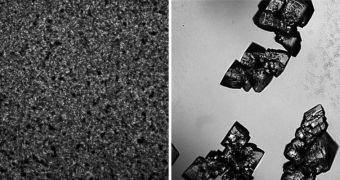According to the conclusions of a new study by researchers in the United States, it would appear that genetically-modified microorganisms could aid the effort of capturing and storing atmospheric carbon dioxide (CO2).
The chemical is extremely dangerous, since it leads to the greenhouse effect that promotes global warming. The latter then causes climate change, with devastating consequences for the entire world.
Humans release increasingly large amounts of CO2 into the atmosphere every year, so the situation is getting worse by the day. However, some scientists believe that carbon capture and storage (CCS) techniques could potentially address the problem.
Primarily, the CCS approach involves first capturing CO2 before it gets released in the air. This is usually done by installing specialized scrubbers inside the smokestacks of coal-, oil- or gas-burning power plants. The devices collect the carbon, and then lead it to a storage facility.
Things get tricky in the next stage of the process, when the chemical needs to be stored. Scientists advocate the use of porous rocks deep underground, which can combine injected CO2 with salty water filled with metal ions.
The chemical reactions that occur then lead to the formation of minerals such as calcium carbonate (CaCO3), which remain stable for millions of years. The problem is that mineral formation takes millennia, and we obviously don't have that long to come up with a solution to climate change.
But researchers at the US Department of Energy's (DOE) Lawrence Berkeley National Laboratory (Berkeley Lab) Center for Nanoscale Control of Geologic CO2 may have come up with a solution.
They say that the process that leads to the formation of stable CaCO3 inside porous rocks can be augmented by the addition of genetically engineered bacteria. The microorganisms could enable the formation of stable minerals in only a fraction of the time the process usually needs.
The research group, which was led by biochemist Jenny Cappuccio, determined that modifying the genetic code of the Caulobacter vibrioides bacteria so that its surface attracts more ions was an excellent way to accelerate mineral formation.
In addition to applications for fighting climate change, the discovery could also be used for paleontological and archaeological investigation, for isolating radioactive isotopes, or for stabilizing soils, Science Now reports.

 14 DAY TRIAL //
14 DAY TRIAL //